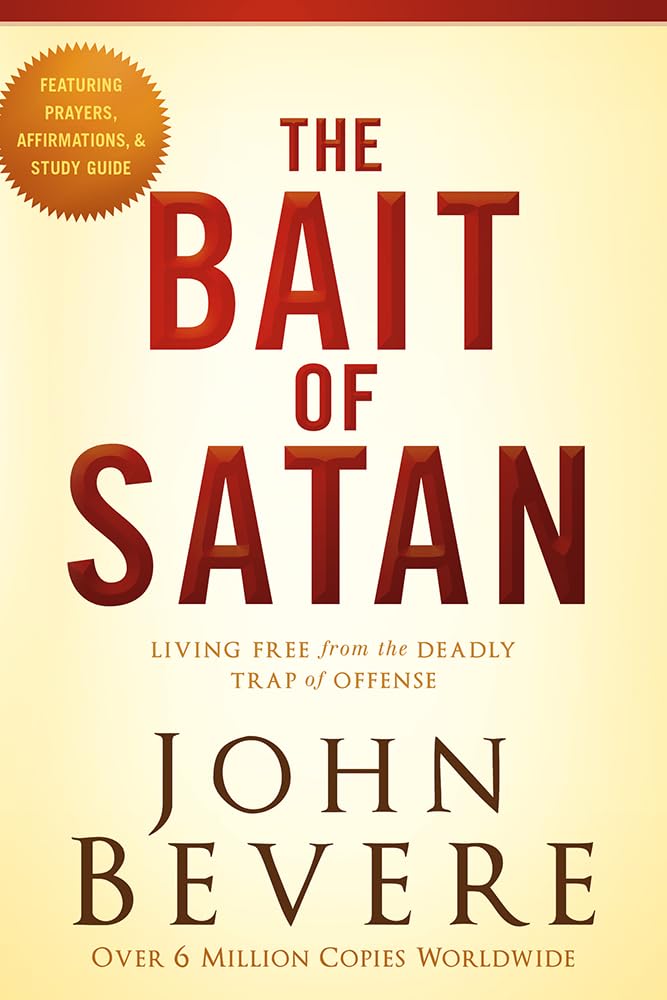The Bait Of Satan By John Bevere Book Review
If you click a link in this blog post and make a purchase I may receive a sponsored commission at no extra cost to you and this will help us to continue sharing this ministry.
If you’ve been walking with God for any length of time, you’ve probably experienced moments when someone’s words or actions hurt you deeply maybe even within the church. Perhaps a friend betrayed your confidence, a pastor disappointed you, or a loved one misunderstood your intentions. Those wounds sting, and sometimes, even after we pray or move on externally, they linger in our hearts.
That’s exactly what John Bevere’s book, The Bait of Satan, speaks to with incredible insight and conviction. Originally published in 1994 and still transforming lives today, this book uncovers one of the enemy’s most subtle yet destructive traps: offense.
Through biblical truth, personal stories, and convicting reflection, Bevere shows readers how Satan uses offense as bait to divide relationships, weaken faith, and separate us from God’s best. It’s not just a “self-help” book it’s a spiritual mirror that helps you see what’s really going on in your heart and what God can do to set you free.
Let’s dive into the heart of this powerful message and explore what makes The Bait of Satan one of the most impactful Christian books of the last few decades.

CLICK HERE TO BUY BOOK ON AMAZON
1. The Central Message: Offense Is Satan’s Trap
From the very first chapter, Bevere lays out a bold, eye-opening truth offense is Satan’s primary weapon to destroy relationships and derail believers.
He explains that when we hold onto bitterness, resentment, or anger even in small amounts we take the bait that Satan sets before us. The “bait” is not the offense itself, but our reaction to it. The moment we choose unforgiveness or self-pity over reconciliation and grace, we’re caught in the trap.
Bevere writes, “Many are unable to function properly in their calling because of the wounds, hurts, and offenses that offenses have brought into their lives. They are handicapped and hindered from fulfilling their potential.”
This insight hits hard because it’s so relatable. We all deal with disappointment and betrayal. But Bevere’s message is clear holding onto offense doesn’t hurt the offender it hurts us. It blocks our growth, clouds our discernment, and steals our peace.
The call is to recognize offense for what it is a tool of the enemy and refuse to take the bait.
2. The Biblical Foundation: Learning from Scripture’s Examples
One of the book’s greatest strengths is how deeply rooted it is in Scripture. Bevere uses biblical stories to bring his message to life, showing that offense has always been one of Satan’s favorite tools.
He points to the story of Joseph as a powerful example. Joseph was betrayed by his brothers, sold into slavery, and wrongfully imprisoned yet he never allowed bitterness to take root. Instead of seeking revenge, Joseph trusted God’s plan. His response “You meant evil against me, but God meant it for good” (Genesis 50:20) reveals a heart free from offense and filled with forgiveness.
Bevere also discusses King David’s relationship with Saul. Despite Saul’s jealousy and repeated attempts to kill him, David refused to dishonor God’s anointed. His humility and restraint demonstrate what it means to stay submitted to God, even when people mistreat you.
By using these stories, Bevere reminds readers that God can use every hurt for His purpose but only if we let go of offense and trust His justice.
3. The Subtlety of Offense: It’s Not Always Obvious
One of the most insightful parts of The Bait of Satan is how Bevere explains the subtle nature of offense. It doesn’t always come in big, dramatic ways sometimes it’s the small, everyday irritations that slowly harden our hearts.
He points out that unresolved offense leads to deception. When we justify our bitterness, we start believing lies like:
-
“I have a right to feel this way.”
-
“If they loved me, they wouldn’t have done that.”
-
“I’ll forgive them when they apologize.”
These thoughts feel valid, but they’re poison disguised as protection. Bevere warns that harboring offense distorts our spiritual vision, making it harder to hear God clearly. We may think we’re walking in truth when we’re actually walking in pride or self-righteousness.
He reminds readers of Jesus’ words in Luke 17:1, where He said, “It is impossible that no offenses should come.” In other words, being offended is inevitable but living offended is a choice.
4. The Freedom of Forgiveness
At the heart of The Bait of Satan is the call to forgive truly forgive, from the heart. And Bevere doesn’t sugarcoat how difficult that can be.
He acknowledges the deep pain that betrayal and rejection cause. Forgiveness, he explains, isn’t about minimizing the offense or pretending it didn’t hurt. It’s about releasing the offender to God’s judgment and choosing peace over vengeance.
Bevere beautifully writes, “When you forgive, you in no way change the past but you sure do change the future.”
This section of the book is incredibly freeing. Bevere explains that forgiveness is not a feeling but a decision of obedience. It’s something we do not because the person deserves it, but because Christ forgave us first (Ephesians 4:32).
He also shares his own stories of struggling with offense even in ministry and how God used those moments to teach him humility and dependence on His grace.
5. The Test of True Love and Maturity
One of Bevere’s recurring themes is that our response to offense reveals our spiritual maturity.
Anyone can love those who love them, but it takes true Christlike character to love those who hurt or misunderstand you. Bevere calls this the “refining fire” of God the process through which He shapes our hearts and purifies our motives.
He explains that offense is often the testing ground of love. If we can remain kind, patient, and forgiving in the face of injustice, we reflect God’s nature. But if we respond with resentment, we give Satan power over our emotions.
He writes, “A believer who cannot forgive is a believer who has forgotten what they’ve been forgiven of.”
That line alone could transform hearts. It reminds us that the cross is the ultimate example of forgiveness. When Jesus was betrayed, beaten, and crucified, He didn’t retaliate He said, “Father, forgive them.”
That’s the kind of freedom Bevere calls us to walk in.
6. The Power of Humility and Submission
Another major theme in The Bait of Satan is the importance of humility and submission both to God and to spiritual authority.
Bevere acknowledges that this topic can be sensitive, especially in an age where independence and self-expression are prized. But he explains that submission is not about control or hierarchy it’s about trusting God’s order and timing.
When we resist authority out of offense or pride, we actually resist God’s hand at work in our lives. But when we stay humble and obedient, even when it’s hard, we position ourselves for His blessing.
He writes, “If you stay free from offense, you stay free from deception. You will not be taken captive by Satan to do his will.”
This section challenges readers to examine their hearts and ask: Am I truly submitted to God, or am I letting offense dictate my attitude and decisions?
7. The Healing Journey: How to Let Go of Offense
Bevere doesn’t just expose the problem he provides practical, biblical steps to walk in healing and freedom. Here’s how he encourages readers to begin the process:
-
Acknowledge the offense. Pretending you’re not hurt doesn’t heal you. Be honest with God about your pain.
-
Choose forgiveness. It’s not about feelings; it’s a conscious act of obedience.
-
Pray for those who hurt you. This softens your heart and allows God to work in theirs.
-
Release the desire for revenge. Trust that God is just and that He will vindicate you in His time.
-
Stay grounded in Scripture. The Word of God renews your mind and helps you see situations from His perspective.
-
Guard your heart. Don’t allow bitterness to creep back in. Keep your focus on God’s goodness.
These steps are simple but life changing. Bevere reminds us that forgiveness is not a one-time event but a daily choice. Healing takes time but it’s always worth it.
8. The Impact on the Church and Community
One of the most important points Bevere makes is that offense doesn’t just harm individuals it divides the Body of Christ.
When believers hold grudges, gossip, or withdraw from fellowship, the enemy wins. The unity that Jesus prayed for in John 17 becomes fractured, and the church loses its power and witness.
Bevere urges readers to pursue reconciliation actively. He calls Christians to be peacemakers, not just peacekeepers to confront issues with love, not avoidance. The health of the church depends on believers walking in forgiveness and grace toward one another.
He writes, “When we choose to love and forgive, we build bridges instead of walls.”
Imagine how different the church would look if we all lived this truth daily.
9. Why This Book Still Matters Today
Decades after its release, The Bait of Satan remains one of the most relevant Christian books you can read. We live in a culture fueled by outrage social media feuds, political arguments, and broken relationships everywhere you turn.
Bevere’s message is a timeless reminder that we don’t have to live offended. We can choose a higher way the way of grace.
In a world that says, “Cancel those who hurt you,” Bevere reminds us that Christ calls us to “forgive those who hurt you.” That kind of love stands out. It brings healing, peace, and power into our lives and communities.
10. Living Unoffended Is Living Free
The Bait of Satan is not just a book it’s a spiritual detox. It exposes the poison of offense that we sometimes carry without realizing it and offers the antidote of God’s love and forgiveness.
John Bevere’s message is both convicting and liberating. It reminds us that living free from offense is not optional for believers it’s essential. It’s how we keep our hearts pure, our relationships healthy, and our connection with God strong.
You’ll close this book with a renewed sense of purpose, a lighter heart, and a clearer understanding of how to protect your peace. Most importantly, you’ll see that refusing to take the bait of offense doesn’t make you weak it makes you victorious.
As Bevere writes, “Your response to offense determines your future.”
That’s a truth worth holding onto.
Conclusion
If you’re looking for a book that will challenge your heart, strengthen your walk with God, and help you let go of bitterness once and for all, The Bait of Satan is an absolute must-read.
It’s for anyone who:
-
Has been hurt by others especially within the church.
-
Wants to break free from bitterness or unforgiveness.
-
Desires deeper intimacy with God.
-
Wants to understand how spiritual maturity is tested through relationships.
Bevere’s writing is clear, compassionate, and filled with biblical wisdom. His personal stories make the message relatable, while his teaching brings spiritual clarity to one of the most common struggles believers face.
By the time you finish, you won’t just know how to avoid Satan’s trap you’ll be equipped to help others walk in freedom, too.
The Bait of Satan is one of those rare books that doesn’t just inform you it transforms you. It’s a wake-up call to guard your heart, forgive freely and live the abundant, unoffended life that Christ died to give you.






